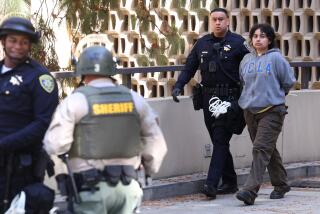EL SERENO : Students’ Verdict: Trial Class a Winner
- Share via
It’s a case of an accused drunk driver. The prosecution and the defense are both deep into figuring out their strategies, searching for flaws that might be detected by their opponents.
The scene is not a courtroom, but a class at Wilson High School, where the participating students are enrolled in the school’s Administration of Justice magnet program, designed to draw students to careers in law and policing.
This year, the Youth and Law class is studying for a mock trial with the help of USC law students who have volunteered to participate in “Street Law,” a legal literacy course that helps high school students understand legal rights and responsibilities. More than 30 law schools across the country take part in the magnet program.
“The benefit of having the SC students is it’s much easier (for the high school students) to mirror themselves in young people, whereas with me, there’s probably more distance between them and myself,” said teacher Craig Mitchell.
The class has captured some hard-to-reach students who have not shown much interest in other subjects, Mitchell added.
Some of the students say the drunk-driving case, which illustrates conflicts between an individual’s right to privacy and a community’s need to protect itself through law enforcement, has been a challenge.
“It’s a lot of work,” said Adrian Garcia, 17.
“You have to keep reading and going over it and over it and finding something new. I’m always finding new facts. I love it.”
In the mock case, Garcia was working on the defense of the accused, who police also suspected of assaulting a pizza delivery man who is in a coma. Garcia and other students on the defense team were trying to prepare their cross-examination and find weaknesses in the statements of the prosecution’s key witness.
On the other side of the room, the prosecution team mapped out its plan of attack, highlighting the good character of its witness. The prosecutors learned that they cannot ask leading questions on direct examination but must phrase their questions in a more forthright manner.
“He’s guilty, he’s guilty, he’s guilty,” said JoVonne Savant, 16, reading the case again. “But now that I’m looking at the details, I don’t know . . . I go to sleep with this thing in my hands.”
Fellow prosecutor Annetka Hardie, 16, said the students have developed strong arguments on both sides of the case.
“Everybody’s into it,” Hardie said. “But you’re gonna see us be victorious.” Hardie and Savant slapped hands and continued rewriting questions to ask the key prosecution witness.
On Friday, they will see how their arguments hold up in a mock trial. Mitchell said he hopes the class continues to develop and eventually takes part in state mock-trial competitions.
“Some of them take to it naturally. They would be real good litigators if they pursued this,” said Mitchell, who also practices law part time.
The USC law students said they were impressed with the students.
“All of them were very enthusiastic,” said Jim Clack, a third-year student.
“They were well-prepared and intelligent. But they were diverse too. You can tell they come from different backgrounds.”
More to Read
Sign up for Essential California
The most important California stories and recommendations in your inbox every morning.
You may occasionally receive promotional content from the Los Angeles Times.










